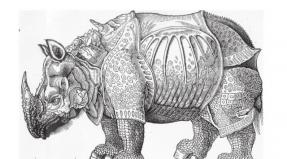The hedonistic meaning of life. The philosophy of the meaning of life
"The misfortune of a modern person is great:
he lacks the main thing - the meaning of life "
I.A. Ilyin
None of us loves meaningless work. For example, wearing bricks there, and then back. Dig "From here to lunch". If we are asked to make such a job, it inevitably cause disgust. For disgusting there are apathy, aggression, insult I.T.P.
Life is also a job. And then it becomes clear why a meaningless life (life without meaning) is pushing us on the fact that we are ready to quit all the most valuable, but to escape from this lack of meaning. But, fortunately, there is a meaning of life.
And we will definitely find it. I would like, despite the volume of this article, you read it carefully and to the end. Reading is also labor, but not meaningless, and which will pay off by a hundredfold.
Why a person's sense of life
Why does a person know the meaning of life, can I somehow live without him?
No animal needs this understanding. It is the desire to understand the purpose of his arrival in this world distinguishes a person from animals. A person is a higher country creature, it is not enough for him to eat and multiply. Limiting the needs of only physiology, it cannot be truly happy. Having the meaning of life, we get the goal to which we can strive. The meaning of life is the measure of what is important, and what - no, which is useful, and what is harmful to achieve our main goal. This is a compass that shows us the direction of our life.
In such a complex world in which we live, it is very difficult without a compass. Without it, we inevitably come back from the way, we fall into the labyrinth, we rest in a dead end. It was about this that the outstanding philosopher of antiquity of Seneca said: "Who lives without a goal ahead, he always wanders" .
Day after day, month after month, year after year we wander on dead end, without seeing exit. As a result, this chaotic journey leads us to despair. And so, stuck in the next impasse, we feel that we have no strength, nor the desire to go further. We understand that we are doomed to get from one dead end in another. And then there is a thought of suicide. Indeed, why live, if you can not get away from this terrible labyrinth?
Therefore, it is so important - to strive to resolve this issue about the meaning of life.
How to evaluate how true a certain meaning of life
We see a person who does something in the mechanism of their car. Is there a point in what he does, or not? A strange question, you will say. If he replaced the car and takes her family to the cottage (or a neighbor in the clinic), then, of course, there is. And if it makes himself a whole day in his broken car, instead of paying the time to my family, help his wife, read a good book, and does not go anywhere, then, of course, there is no point.
So and in everything. The meaning of activity is determined by its result.
The meaning of human life also needs to be assessed through the total. The result for a person is the moment of death. There is nothing more definite than the moment of death. If we are entangled in the labyrinth of life and cannot unwind this tangle from the beginning to find the meaning of life, let's upload it from another, obvious and exactly known end - death.
It is about this approach and wrote M.Yu. Lermontov:
We drink from the bowl of being
with closed eyes
choined ochois edge
in their own tears;
when before death with eyes
tie falls
and all that seduced us
with string drops;
then we see that empty
there was a malicious bowl
that the drink in it was a dream,
and that she is not ours!
Illusory meanings of life
The most primitive answers to the question of the meaning of life
Among the answers to the question about the meaning of life there are three most primitive and stupid. Usually such answers give people who seriously thought about this issue. They are so primitive and devoid of logic that it makes no sense for them in detail. Let's briefly consider these answers, the true purpose of which is to justify your laziness and do not work on finding the meaning of life.
1. "Everyone lives so, without thinking, and I will live"
First, not everyone lives. Secondly, are you sure that these "all" are happy? And are you happy, living "like everyone", without thinking? Thirdly, what to look at all, everyone has their own life, and everyone is building it himself. And when something does not charge, not "everyone" will have to blame, and itself ... Fourth, sooner or later, most of the "everyone", being in any serious crisis, still think about the meaning of their existence.
So it may not be necessary to focus on "all"? Even Seneca warned: "When the question arises about the meaning of life, people never reason, but they always believe others, and meanwhile, in vain, it is dangerous in vain." Maybe you should listen to these words?
2. "The meaning of life is to understand this very meaning" (the meaning of life is in the life itself)
Despite the fact that these phrases are beautiful, claimable, can work in a group of children or low-intellectual people, but there is no point in them. If you think, it is clear that the process of finding sense itself cannot be simultaneously the meaning itself.
Anyone is understandable that the meaning of sleep is not to sleep, but in the restoration of the body systems. We understand that the meaning of breathing is not to breathe, but in the fact that oxidative processes in cells can occur, without which life is impossible. We understand that the meaning of work is not to just work, but to benefit yourself and people at this work. So talking about the meaning of life is that the meaning is to look for - children's excuses for those who do not want to think serious about it. This is a convenient philosophy for those who do not want to confess in the absence of his meaning of life and does not want to look for him.
And postponement of the meaning of life at the end of this life is the same as wishing to get a ticket to a luxury resort on mortal app. What is the point in what you can no longer use?
3. "There is no meaning in life" .
The logic here is this: "I did not find sense, it means it is not." The word "find" implies that the person undertakes some kind of search (meaning). However, in truth, many of those who claim that there is no sense, really looking for him? It will not be honest to say: "I didn't try to find the meaning of life, but I suppose he was not."
Do you like this statement? It is unlikely that it looks reasonable, rather it sounds just childish. The wild papuas may seem completely unnecessary, meaningless subject calculator, skis, cigarette lighter in the car. He just does not know what this subject is needed! To understand the benefit of these items, you need to study them from all sides, try to understand how to use them correctly.
Someone will objected: "I really sought the point." The next question arises: Did you look for it?
Self-realization as a sense of life
Very often you can hear that the meaning of life is in self-realization. Self-realization is the realization of its possibilities in order to achieve success. You can realize yourself in different spheres of life: family, business, art, politics, etc.
This look is not new, I also thought Aristotle. He spoke that the meaning of life was in the valiant life, successes and achievements. And it is in this self-development that the majority now sees the meaning of life.
A person, of course, must realize himself. But making self-realization the main meaning of life is wrong.
Why? Let's think about it, taking into account the inevitability of death. What a difference - a man selfalized and died, or did not selfie, but also died. Death equals these two people. Life successes will not take on the world!
It can be said that the fruits of this self-realization remain on Earth. But firstly, these fruits are not always of good quality, but secondly, even if they are the best quality, then the person who left them, is zero. He cannot take advantage of his success. He is dead.
Imagine that you managed to self-realize - you are a well-known politician, great artist, writer, warlord or journalist. And now you ... at your own funeral. Cemetery. Autumn, lights rain, leaves fly to the ground. Or maybe summer, birds are rejoiced by the sun. Over the open coffin, the words admire you: "How I'm happy for the deceased!N Very well managed that. All those abilities that were given to him, he embodied not that at 100, but for all 150%! "...
If you revive for a second, do you comforting such speeches? ..
Memory as a meaning of life
Another answer to the question about the meaning of life: "To leave your mark, to remember me." At the same time it happens that it doesn't even matter to a person, or a good memory, or not very good, he will leave himself. The main thing - "To remember me!" For this, many people in all possible ways seek fame, popularity, to glory, to becoming a "famous man."
Of course, good memory has some kind of value for eternity - this is a grateful memory of our descendants about us who left them gardens, at home, books. But how much will this memory last? Do you have a grateful memory of your great-grandfathers? And Praparedah? .. no one will not remember forever.
But in general, the external achievements of a person (the most realization) and the memory of others about these successes correlate as a sandwich and the smell of sandwich. If the sandwich itself is useless, even more so - it does not eat his smell.
What is the case before this memory, when will we die? We will no longer be. So is it worth then to devote your life to "leave a trace"? No one can take advantage of his glory when this world leaves. No one can estimate the degree of his fame in the grave.
Imagine yourself at your own funeral. The one who is entrusted with the tombstone, it is intensively thinking that would be a good to say about you. "We are hurrying a difficult person! That's how many people came here to spend it on the last path. Few honors such attention. But this is only a weak reflection of the glory thatN had in life. Many envied him. He was written about him in newspapers. On the house whereN lived, a memorial plate will be fixed ... ".
Dead, turn for a second! Listen! You will greatly please such words? ..
The meaning of life is to preserve beauty and health
Although the ancient Greek philosopher Metrhrore also argued that the meaning of life in the body of the body and in a firm hope that it can be rejected on it, most people are still clear that it cannot be meaning.
It is difficult to find something more meaningless than life for the sake of maintaining their own health and appearance. If a person takes care of his health (engaged in sports, physical education, prophylactic medical examinations take place in a timely manner), then this can only be welcomed. We are talking about a friend, about that situation when maintaining health, beauty, longevity becomes the meaning of life. If a person, seeing meaning only in this, is involved in the struggle for the preservation and decoration of his body, he senses himself to an inevitable defeat. Death will still won this battle. All this beauty, all this imaginary health, all these are powered muscles, all these experiments on rejuvenation, solarium, liposuction, silver threads, the suspenders will not leave anything after themselves. The body will go under the ground and rotates, as it should be protein structures.
Now you are the old pop star, which was pushing to the last breath. There are many talkative people in the show business, which will always find what to say in any situation, including at the funeral: "Ah, what kind of beauty died! What a pity I could not please another 800 years. It seemed that death was no longer power overN! How unexpectedly, this death broke her from our ranks aged 79 years! She showed everyone how old age can be defeated! "
Perfect the dead body! Do you have an assessment of how you lived?
Consumption, pleasure as a sense of life
"The acquisition of things and their consumption cannot give our life meaning ... The accumulation of material things can not fill
the emptiness of the life of those who have no confidence and goal "
(Merchant millionaire Savva Morozov)
Philosophy of consumption appeared today. Another famous ancient Greek philosopher Epicur (341-270 to R.H.), who believed that the meaning of life is to avoid troubles and suffering, receiving pleasure from life, reaching peace and bliss. You can also call this philosophy of the cult of pleasure.
This cult reigns in modern society. But even the epicurus stipulated that it was impossible to live only for the sake of pleasure, while not agreed with ethics. We now reached the reign of hedonism (in one other way, life is just for the sake of pleasure), in which no one will actually agree with ethics. We are configured on this advertising, articles in magazines, television talk shows, endless series, reality shows. This is permeated with our entire everyday life. Everywhere we hear, we see, we read the calls to live in your pleasure, take everything from life, catch the moment of luck, "rejuvenate" in full ...
With the cult of pleasure, the cult of consumption is closely connected. In order to enjoy, we must buy something, win, order. Then consume it, and everything is anew: see advertisement, buy, consume to destination, enjoy. It seems to us that the meaning of life is in that and is to use what is universally advertised, namely: certain goods, services, sensual pleasures ("sex"); impressions of pleasure (travel); the property; Diverse "Chivo" (glossy magazines, cheap detectives, ladies' novels, books based on TV series), etc.
Thus, we (not without the help of the media, however, in their will) we turn ourselves in the intentional semi-suicide semi-dual, whose task - only eat, drink, sleep, walk, drink, satisfy the sexual instinct, dress up ... self Gives yourself to this level, limiting the purpose of your life with satisfaction of primitive needs.
Nevertheless, having tried all the imaginable pleasures to a certain age, a person is happily and feels that, despite a variety of pleasures, his life is empty and there is not enough of something important. What? Meaning. After all, the pleasure of meaning not to find.
The pleasure cannot be the meaning of existence, if only because it passes and, therefore, ceases to be pleasure. Any need is satisfied only at a certain time, and then declares itself again and again, and with a new force. In our pursuit of pleasure, we look like drug addicts: I get some pleasure, it goes soon, we need the next dose of pleasure - but it also passes ... And we need this pleasure, we have the whole life on this. And the more we get pleasure, the more we want again, because needs always grow in proportion to the degree of their satisfaction. All this is similar to the life of the drug addict, with the only difference that the drug addict is chasing drugs, and we are at different other pleasures. It also resembles a don running for carrots tied to front: We want to catch, but we cannot catch up with ... It is unlikely that someone from us deliberately want to look like such a donkey.
So, if you seriously think about, it is obvious that pleasure cannot be the meaning of life. It is quite natural that a person who considers him a goal in life to receive pleasures, sooner or later comes to a serious mental crisis. For example, in the US, about 45% of people drink antidepressants, despite the high standard of living.
We consume, consume, consume ... and we live as if we will consume forever. However, there is death ahead - and it is reliably known to everyone.
Now over your coffin can say: "What a saturated lifeN lived! We, his loved ones, have not seen him for months. Today he is Paris, tomorrow - in Bombay. It was possible only to envy such a lifetime. How many in his life were different pleasures! He was truly lucky, the ballet fate! how manyN changed the cars and, I apologize, wives! His house was and remains a full bowl "...
Open one eye and take a look at the world that you left. What do you think you lived life, how is it necessary?
The meaning of life is to achieve power
It is no secret that there are people who live in order to increase their power over others. That is how I tried to explain the meaning of life Nietzsche. He said that the meaning of man's life in the desire for power. True, the story of his life (madness, grave death, poverty) began to refute this statement in his life ...
Popular people are meaningful to prove to themselves and others that they can rise above others, to achieve what others could not. Well, what is the meaning? In the fact that a person can have a cabinet, appoint and dismiss, take bribes, make important decisions? Is this sense? In order to get and keep power, they earn money, looking for and maintaining the necessary business communications and make much more, often overpay through their conscience ...
In our opinion, in such a situation, power is also a kind of drug from which a person receives unhealthy pleasure and without which he can no longer, and which requires a constant increase in the "dose" of power.
Is it reasonable to see the meaning of your life in the realization of power over people? On the threshold of life and death, looking back, the person will understand that all his life he lived in vain, then for what he lived, leaves him, and he remains with anything. Hundreds of thousands had a huge, and sometimes even incredible power (remember Alexander Macedonian, Genghis Khan, Napoleon, Hitler). But at one point they lost her. So what?
No one else has been immortal. After all, what happened to Lenin is far from immortality. Is the great joy - to become a crowd after death and the object of curiosity of the crowd, like a monkey in the zoo?
At your funeral a lot of armed guards. Experience. Fear terrorist attack. Yes, you yourself died not with your death. Guests dressed in black with needles are similar to each other. The one who "ordered" you, too, expresses the condolences to the widow. Someone reads a well-posed voice: "... life is always in sight, although constantly surrounded by guard. Many people envied him, he had a lot of enemies. It is inevitable at the scale of the leadership, the scale of power that hadN ... such a person will be very difficult to replace, but we hope thatNn appointed to this post will continue all that startedN ... "
If you heard it, you would understand that they lived not in vain?
The meaning of life is the increase in material benefits
English philosopher XIX century John Mill saw the meaning of human life in achieving benefits, benefits, success. I must say that Mill's philosophy was a target for ridicule almost all of his contemporaries. Until the XX century, Mill's presentation was exotic views that were not supported by almost anyone. And in the last century the situation has changed. Many people believed that in this illusion you can find a meaning. Why in illusion?
Now many people think that a person lives in order to make money. It is in the multiplication of wealth (and not the pleasure of spending it, as we talked above) they see the meaning of their lives.
It is very strange. If it's not the meaning of everything that you can buy money, - pleasure, memory, power, how can it mean the money yourself? After all, not a single penny, no billions of dollars will not be used after death.
Rich funerals will be a weak consolation. The dead body is not easier from the softness of the upholstery of an expensive coffin. Dead eyes are indifferent to the shine of an expensive cataphney.
And again the cemetery. Place next to the famous. The gravestone has already been tiled. The cost of the coffin could be trained in the poor young man at the university. Above the group of relatives is flowing cloud of mutual hatred: not everyone is satisfied with the section inheritance. Even in admiring speeches, the slippers are hidden by gloating: "N. was a chosen person. The alloy of good luck, will and perseverance helped him to achieve such success in business. I think if he had lived another 3 years, we would see his name in the list of the largest billionaires of Forbes magazine. We, who knew him for many years, could only watch with admiration how highly took off our friend ... "
If for a moment to interrupt the silence of death, what would you say to it?
Will be remembered in old age
Some say: "Yes, of course, when you lie on my deathbed, then everything loses its meaning. But at least it would be what to remember! For example, many countries, cheerful gulyans, good and diet life, etc. ". Let's honestly understand this version of the meaning of life - to live only in order to have something to remember before death.
For example, we had a full, full of impressions, rich and fun life. And now the last feature we can remember all the past. Will it bring this joy? No, it will not bring. I will not bring because it has already passed good, but you cannot stop time. Joy can only be obtained in the present from what was done really good for others. Because in this case, what you did, lives. The world remains to live, with the good that you did for him. But to feel the joy of what you pleased with yourself to the resorts, I threw money, I had power, satisfied my vanity and pride - it would not work. It will not happen because you are mortal, and soon there will be no memories of it. All this will die.
What is joyful for hungry in that he had once had the opportunity to fill? No joy, but on the contrary, pain. After all, the contrast between good "earlier" and is terribly bad and hungry "today" and is completely no "tomorrow".
For example, an alcoholic cannot please for the fact that he drank a lot yesterday. He today is just bad. And he cannot remember yesterday's vodka and thus will hang. He needs her now. And real, and not in memories.
During this time life, we can have a lot of things to be, in our opinion, good. But we can not take anything from this life, except the soul.
For example, we came to the bank. And we are allowed to come to the bank repository and take any amount of money. We can keep how much money in your hands, fill your pockets, fall into the heaps of this money, throw them, sprinkle themselves, but ... we cannot get out of the bank's repository. These are the conditions. Tell me, what you kept in the hands of irrelevant sums, but what will it give you when you leave the bank?
Separately, I would like to bring an argument for people who want to end the life. You, how to anyone else should be obvious the futility of good memories. And you had good moments in your life. But now, remembering them, you do not get better.
One of the tasks of life but not meaning
The meaning of life is life for loved ones
Very often it seems to us that life for the sake of loved ones is just a major sense. Many people see the meaning of their lives in close person, in a child, a spouse, less often - a parent. They often say that "I live for him," you live, and his life.
Of course, love your loved ones, sacrifice something for them, helping to go through life - it is necessary, naturally and correctly. Most people on Earth want to live, getting joy from family, raise children, take care of parents and friends.
But can this be the main meaning of life?
No, there is no close to, see only in them meaning all Life, all your affairs is a dead end.
This can be understood with a simple metaphor. A person who sees the whole point of his life in a close person is similar to a football (or other sports) fan. The fan is no longer just a fan, it is a person who lives sports, lives by luck and failures of that team, which he is. He says so: "My team", "We lost", "We have prospects" ... He identifies himself with players on the field: he is as if he drives a soccer ball himself, he rejoices their victory as if it was his victory . Often they say so: "Your victory is my victory!" And on the contrary, the defeat of their favorites he perceives extremely painful as a personal failure. And if for any reason he is deprived of the opportunity to watch the match with the participation of "his" club, he feels as if he was deprived of oxygen, as if life itself passes by him ...From the outside, this fan looks ridiculous, his behavior and attitude to life seems to be inadequate and even stupid. But don't you look like the meaning of all your life see in another person?
The fan is easier than to play sports itself: it's easier to watch the match on TV, sitting on the sofa with a bottle of beer, or in the stadium surrounded by noisy friends than to run on the ball behind the ball. Here you've whined for "their" - and it seems he had already played football ... There is a person's identification with those for whom he is sick, and it suits this: it is not necessary to train, spend time and strength, you can take a passive position and at the same time getting a lot Strong emotions, practically the same as if he was engaged in sports. But no costs, inevitable for the athlete itself.
We also do, if the meaning of our life is another person. We identify themselves with him, we live not your life, and Him. We are not rejoicing with our own, but exclusively to his joys, sometimes we even forget about the most important needs of your soul for the sake of small everyday human needs. And we do it for the same reason: because it is easier. It is easier to build someone else's life and correct other disadvantages than to deal with your soul, work on it. It is easier to take the position of the fan, "hurt" for loved ones, without working on yourself, simply waving his hand to his spiritual life, on the development of his soul.
Nevertheless, any man is mortal, and if he has become the meaning of your life, then having lost it, you will almost inevitably lose the desire to live on. The most serious crisis will come, to get out of which it is possible, only finding a different meaning. You can, of course, "switch" to another person, and live now for the sake of it. Often, people do that, because They are accustomed to such a symbiotic connection and they simply do not know how to live in a different way. Thus, a person is constantly in unhealthy psychological dependence on the other, and he cannot cure it, because it does not understand what is sick.
Transferring the meaning of his life to the life of another person, we lose ourselves, completely dissolved in the other - the same mortal person as we. We sacrifice for the sake of this person, whom it also does not necessarily ever become. Once the last feature, we will not ask ourselves: what have we lived for? They squandered all their souls for a temporary, that without a trace will devastate death, created themselves the idol from a loved one, in fact, they lived not their own, and his fate ... Is it worth dedicated to this?
Some do not live someone else, but their lives with hope that they can leave close inheritance, material values, status I.T.P. Only we know well that it is not always good. Unopened values \u200b\u200bcan corrupt, descendants can remain ungrateful, with the descendants themselves may happen something and thread breaks. In this case, it turns out that living only for others, the man himself lived his life without meaning.
Meaning of life - work, creativity
"The most expensive person in a person is life. And it is necessary to live it so that it is not painfully painful for aimlessly lived years so that, dying, could say: all life and all the forces were given to the most beautiful in the world - the struggle for the liberation of mankind. "
(Nikolai Ostrovsky)
Another common answer to the question of the meaning of life - work, creativity, some "Case of Life". Everyone knows the dividing formula "Last" life - to give birth to a child, build a house, plant a tree. As for the child, we briefly discussed above. What about "House and Tree"?
If we see the meaning of your existence in any lesson, even if useful for society, in creativity, in work - we, being thinking of people, sooner or later think about the question: "What will happen to all this when I die? And what is the benefit of me from all this, when will I lie at death? " After all, we all perfectly understand that neither a house nor a tree is eternal, they will not preserve and several hundred years ... and those classes we devote all their time, all their strength, if they did not benefit our soul, whether they had Do they mean? In the grave, we will not take with you any fruits of your work - neither works of art, nor the gardens of the trees planted by us, nor our most brilliant scientific developments, nor favorite books, nor the power or the biggest bank accounts ...
Solomon spoke not about this, looking at the sunset of life on all his great accomplishments that were the affairs of his life? "I, Ecclesiast, was the king over Israel in Jerusalem ... I took great things: built my houses, planted myself vineyards, arranged gardens and groves to himself and planted all sorts of prolific trees in them; made a reservoir for irrigation of the groves that make trees; I purchased myself servants and maids, and households were with me; Also, a large and small cattle was more than everyone who had before me in Jerusalem; gathered silver and gold and jewels from kings and regions; He won the singers and singers and the comfort of the sons of human sons - different musical instruments. And I became great and rich more than all that were before me in Jerusalem; And my wisdom was with me. What would my eyes wish, I did not give up to them, I did not bother my heart any fun, because my heart was happy in all the works of my, and it was my share of all my works. And I looked at all my deeds, who made my hands, and on the work that I worked, making them: And so, everything is a fuss and tomorrow, and there is no use from them under the sun! (Eccles. 1, 12; 2, 4-11).
"The affairs of life" are different. For one business of life, this ministry of culture, the other - the ministry of the people, the third - the service of science, and the fourth - ministry for the sake of "bright future descendants", as he understands him.
The author of the epigraph, Nikolai Ostrovsky, selflessly served "the cause of life", served as "red" literature, Lenin's case and dreamed of communism. A courageous man, a workable and talented writer, a convinced Idea Warrior, he lived "the struggle for the liberation of mankind," gave life and all the forces of this struggle. Not many years have passed, and we do not see this liberated mankind. Again, he was ordinalized, the property of this free mankind, shared the oligarchs. Selflessness and ideological, sneaking the island, is now the target for ridicule of the owners of life. It turns out that he lived for the sake of a bright future, raised people with his work on the feat, and now these expressions are used by those who do not care about the island and the people. And after all it can happen with any "business of life." Even if it will help generations of other people (many of us are capable of doing so much for humanity?), I still can not help the person himself. After death, this will not be a consolation for him.
Life is a train to nowhere?
Let us give an excerpt from the wonderful book of Yulia Ivanova "Dreming Doors". In this book, a young man, a baloveman of fate, Ghania, living in the godless time of the USSR, having a good education, successful parents, the prospects are thinking about the meaning of life: "Ghania was surprised to find that modern humanity is not very thinking about it. Nobody wants, of course, global disasters, atomic or environmental, well, and in general, we are going and we are going ... Some still believe in progress, although with the development of civilization the likelihood to fly under atomic, ecological or other slopes is very increasing. Others would gladly turn the locomotive back and build about it all sorts of rainbow plans, well, the majority simply goes in an unknown direction, knowing only one thing - sooner or later you will be thrown out of the train. Forever and ever. And he will surround himself further, the season of suicide. Over each death sentence, already hundreds of generations changed each other, and neither escape nor hide. The verdict is not subject to appeal. And the passengers try to behave as if they are forever. More comfortably arranged in the coupe, change the rugs, curtains, get acquainted, give birth to children - so that the offspring took your coupe when they throw you away. A kind of illusion of immortality! Children, in turn, will be replaced by grandchildren, grandchildren - great-grandchildren ... Poor humanity! Train of life that has become a death train. The dead, already converted, hundreds of times more than living. And they lived, sentenced. Here are the steps of the conductor - for someone came. Are you not for you? Feast in Time of Plague. Eat, drink, having fun, play cards, in chess, assemble the labels, stuff the suitcases, although they require "without a thing." And others build touching plans to reorganize a coupe, their car or even the entire train. Or the car goes war on the car, the coupe on the coupe, the shelf on the shelf in the name of the happiness of future passengers. Millions of lives flour down ahead of time, and the train rushes further. And these most insane passengers have fun clog goat on suitcases of beautiful dreamers. "
This is such an unemployed picture opened with young Ghana after long reflection on the meaning of life. It turned out that every life goal was turning around the greatest injustice and nonsense. Self-affairs and disappear.
Spend your life to pay for future passengers and free them place? Handsomely! But they are also mortal, these future passengers. All humanity consists of mortals, it means that your life is dedicated to death. And if someone from people and reaches immortality - is it fair to immortality on the bones of millions?
Okay, take the consumption society. The most ideal option - I give according to the abilities, I get according to needs. May be, of course, the most terrible needs, and the ability too ... to live to live. Eat, drink, have fun, Riga, go to the theater or there on the run ... leave behind the mountain of empty bottles, stopped shoes, dirty glasses, burned cigarette sheets ...
Well, if the extremes drop ... Come on the train, sit down in your place, behave decently, do it, what do you want, just do not bother other passengers, give way to ladies and old people, do not smoke in the car. Before you leave forever, rent a Bed linen and turn off the light.
Everything in any case ends with zero. The meaning of life is not located. The train goes to nowhere ...
As you understand, as soon as we begin to look at the meaning of life in terms of its limb, our illusions begin to disappear rapidly. We begin to understand that what seemed to us on some stages of life cannot be the meaning of the existence of the whole life.
But does not really mean? No, he is. And known for a long time thanks to the bishop Augustine. It was the Blessed Augustinian that committed the greatest revolution in philosophy, explained, proved and substantiated the presence of the meaning we are looking for in life.
We quote the International Philosophical Journal: "Thanks to the philosophical view of BLI. Augustine, Christian religious teachings, allow you to make logical and complete constructions for finding the meaning of human existence. In Christian philosophy, the question of faith in God is the main conditions for the meaning of life. At the same time, in materialistic philosophy, where the human life is finite and there is nothing for her threshold, the very existence of the condition for solving this issue becomes impossible and in full growth is in -ureous problems. "
Let's and we will try to find the meaning of life in another plane. Try to understand what will be written below. We do not put the goal to impose your point of view, but only give information that can respond to many of your questions.
Meaning of life: where he is
"I learned my meaning seeing your appointment.
The purpose of a person is to be a vessel and a tool of the Divine. "
(Ignatius Bryanchaninov )
Was the meaning of life to us?
If you look for the meaning of life among the above, it is impossible to find it. And it is not surprising that, trying to find it there, a person despair and comes to the conclusion that there is no point. And in fact he is just not there I was looking for ...
Metaphorically looking for meaning can be depicted as follows. A person looking for meaning and not finding it lost a traveler It was in the ravine and looking for the desired road. He wanders among dense, prickly, high bushes growing in a ravine, and is trying to find a way out there to the road with which he got drunk, to the way he would lead to his goal.
But in this way it is impossible to find the right road. You must first get out of the ravine, climb the mountain - and from there, from above, you can see the right path. Also, we seeking the meaning of life, you need to begin to change the viewing point, because from the pit of the hedonistic worldview we do not see anything. Without an application of certain efforts, we will never get out of this pit, and I will never find a sure way of understanding life.
So, you can understand the true, the deep meaning of life can only be bothering, only by purchasing some necessary knowledge. And this knowledge, which is most amazing, is available to each of us. We just do not pay attention to these storehouses of knowledge, pass by them, without noticing or contemptuously scaring from them. But the difference of the meaning of life was raised by humanity at all times. All people of previous generations faced with exactly the same problems that we face. There was always a betrayal, envy, emptiness of the soul, despair, deception, treason, troubles, catastrophes and illness. And people were able to rethink and cope with it. And we can use that tremendous experience that has accumulated preceding generations. It is not necessary to reinvent the bike - it was in fact for a long time already invented. We have only left to learn how to ride it. All the same, nothing is better and ingenious we will not come up.
Why are we when it comes to the scientific developments, the achievements of medicine, useful inventions that facilitate our life, a variety of practical knowledge in a particular professional area, etc. - We are widely used by the experience and opening of our ancestors, and in matters so important as the meaning of life, the existence and immortality of the soul - we consider ourselves smarter than all previous generations, and with pride (often with contempt) we reject their knowledge, their experience, and more often Total reject in advance, not even studying and not trying to understand? Is it reasonable?
Is not more reasonable as reasonable: to study the experience and achievements of ancestors, or at least, familiarize themselves with them, reflect, and only then to make a conclusion for themselves, whether the preceding generations were right, or not whether their experience could be useful to us, whether Do we learn their wisdom? Why do we reject their knowledge, not even trying to get? Is it because it is the easiest?
Indeed, in order to say that our ancestors thought primitively, and we are much smarter and more progressive, you don't need a big mind. It's too easy to say unfounderly. And to explore the wisdom of previous generations without difficulty. You must first get acquainted with their experiences, their knowledge, pass through themselves their philosophy of life, try to live for this for this a few days according to her, and then appreciate that this approach to life bears actually - joy or longing, hope or despair, peace of mind or confusion, light or darkness. And then then a person can judge with full law, whether the meaning was faithful, who saw his ancestors in his life.
Life as school
And what, in fact, saw the meaning of life our ancestors? After all, this question was raised by mankind over the centuries.
The answer was always in self-development, in the education of himself, his eternal soul, and in approaching her to God. So thoughts and the Christians, Buddhists, and Muslims. All recognized the existence of the immortality of the soul. And the conclusion was quite logical then appeared: if the soul is immortal, and the body is mortally, it is unreasonable (and even stupid) to devote his brief life to serving the body, his pleasures. Because the body will die, it means to invest all your strength into satisfying his needs - meaningless. (What, in fact, is confirmed today by those desperate materialists approached to the suicide feature.)
So, the meaning of life, they believed our ancestors, it is necessary to look for in good not for the body, but for the soul. After all, she is immortal, and to enjoy acquired benefit will be able forever. And who would not want eternal pleasure?
However, that the soul can enjoy not only here, on Earth, it is necessary to teach it, to raise, elevate, otherwise she will not be able to accommodate that vigorous joy that is prepared by her.
therefore life is possible, in particular, imagine. This simple metaphor helps to get close to the understanding of life. Life is a school in which a person comes to teach his soul. This is the main goal of visiting school. Yes, at school there are a lot of other, except for lessons: a change, chat with classmates, football after lessons, extracurricular activities - visits to theaters, tourists, holidays ... However, all this is secondary. Yes, perhaps it would be more pleasant if we came to school only to run, talk, take a walk in the school yard ... But then we would not have learned anything, I would not get a certificate, could not get further education, nor work.
So, we come to school to learn. But the study itself is also meaningless for their studies. We learn to get knowledge, skills and get a certificate, and then go to work, and live. If we assume that after graduation, there will be nothing more, then attend school, of course, there is no point. And no one argues with it. But in reality, life after school continues, and the school is just one of the stages of it. And on how responsibly we treated our school training, the "quality" of our subsequent life largely depends on the "quality". A person who throws school, believing that he doesn't need knowledge taught in it, and remain illiterate and uneducated, and it will be interfered throughout his future life.
Also stupid, to the detriment of Himself, the person comes, who, having come to school, immediately rejects all the knowledge gained to him, without even familiarizing themselves with them; It claims that it does not believe them that all the discoveries committed before him is nonsense. Comicness and absurdity of such self-confident rejection of all accumulated knowledge is obvious to everyone.
But not everyone, unfortunately, is an even greater absurdity of a similar rejection in a situation where it comes to understanding the deep bases of life. But our earthly life is also a school - school for the soul. She is given to us in order to form your soul, teach her to love to truly, teach it to see in the surrounding world of good, create it.
On the path of self-development and self-education, we will inevitably meet difficulties, as well as training in school can not always be easy. Each of us perfectly understands that any more or less responsible business is associated with a different kind of difficulties, and it would be strange to expect that such a serious thing, like education and education of the soul, will be easy. But these problems, the tests are also needed for something - they themselves are a very important factor in the development of the soul. And if we do not teach your soul to love, strive for light and good, while we still live on earth, then she will not be able to get an endless pleasure in eternity, simply because she unable will perceive good and love.
The old man of Paisius Svyatogorets said wonderfully: "This age is not in order to live His chops, but in order to pass the exams and go into a different life. Therefore, we must stand the following goal: get ready so that when God calls us, to leave with a calm conscience, repaid to Christ and be with him always. "
Life as a birth preparing to a new reality
One can lead in this context another metaphor. During pregnancy, the body of a unborn child grows from one cell to a fully formed man. And the main task of the intrauterine period is to ensure that the child's development has passed correctly and to the end, in order to take the right situation to take the right position and could be born in a new life.
A nine-month stay in the womb is also a whole life in a sense. The child is emerging there, develops, it is good in his own way - the food goes on time, the temperature is constant, it is reliably protected from the impact of external factors ... Nevertheless, at a certain time, the child needs to be born; No matter how well he seemed in his abdomen at Mom, his new life is waiting for such joys, such events that are simply incomparable with the seeming convenience of intrauterine existence. And in order to get into this life, the baby passes through the most serious stress (what are childbirth), experiences an unprecedented pain ... But the joy of meeting with mom and with the new world is stronger than this pain, and life in the world is much more interesting, more pleasant , more diverse than the existence in the womb.
It is similar and our life on Earth - it can be likened by the period of the intrauterine existence. The purpose of this life is the development of the soul, the preparation of the soul by birth into a new, incomparably more wonderful life in eternity. And just as in the case of a newborn baby, the "quality" of that new life in which we will have to directly depends on how correctly we have developed in the "past" life. And those grief that we are found on the life path can be likened by stress testing a baby during childbirth: they are temporary, although they seem to be infinite; They are inevitable, and all through them pass; They are insignificant compared to the joy and enjoyment of a new life.
Or another example: the task of the caterpillars to develop to such an extent to then become a beautiful butterfly. To do this, you need to fulfill certain laws. Caterpillar cannot imagine that it will fly and how it will be. This is a birth in a new life. And this life is radically different from the life of the landed caterpillar.
Life as a business project
Another metaphor that explains the meaning of life is as follows:
Imagine that a kind person gave you an interest-free loan for you to implement your own business project and when it was able to earn money for a future life. The term of the loan is equal to the term of your earthly life. The better you invest this money, the richer and more comfortable will be your life at the end of the project.
One will put a loan into the case, and the other will begin to do this money, arrange drunks, goules, but not to work on the multiplication of this amount. In order not to think and not work, will find a bunch of reasons and justification - "No one loves me," I am weak, "why make money on a future life, if it is unknown that there will be, it will be better to live now, and there will be aware" and .t.p. Naturally, his friend appears immediately, who want to borrow this loan with a person (do not answer them later). They convince him that the debt is not necessary to return that the one who made a loan does not exist (or that the fate of the debtor is indifferent to him). They convince that if there is a loan, then it should be spent on a good and cheerful real life, and not to the future. If a person agrees with them, a goulab begins. As a result, a person comes to bankruptcy. The term to pay a loan is approaching, and it is wicked, and nothing has been earned.
So, God gives us this loan. Credit itself is our talents, mental and physical abilities, mental quality, health, favorable circumstances, external assistance.
Look, are we not similar to the gamers, squanding money for a momentary passion? Would we not played? Do we do not cause our "games" of suffering and fear? And who are those "friends" who are so actively pushing this loan? And these are our enemies - demons. They themselves ordered their talents, their angelic qualities worst. And the same wish us. The most desirable alignment for them is if a person is not just strolling with them this loan, and then he will suffer for it, but if a person just gives them this loan. We know a lot of examples when manipulating weak people, the gangsters were deprived of their housing, money, inheritance, left homeless. The same thing happens and with those who are wasting their lives.
Should I continue this horror? It is not time to think about what we earned and how much time we have left to implement our project.
Often, suicidetes scold God for the fact that they do not get what they want, it is difficult to live, that there is no understanding of I.T.P.
Do not you think that you can not blame God in the fact that we simply do not know how to make sure that it gave that we do not know the laws for which you need to live to flourish?
Agree that it is rather stupid to continue to walk what is given, and even accuse the creditor. Maybe it may be better to think about how to correct the situation? And our lender will always help us in this. He does not act as a Jewish degree, sucking all the juices from the debtor, and lends from love to us.
(Psychologist Mikhail Khassminsky, Olga Pokalyukhina)
How to find the meaning of life? ( Alfrid Langle)
Does it make sense in a soapy opera? ( Ieromona Macarium (Markish))
Choice of good ( Archpriest Dimitri Smirnov)
The meaning of life: increase talents or develop the ability? ( Archpriest Alexy Uminsky)
Humanity throughout its existence is trying to find the meaning of life. He was looking for religious figures, and philosophers. This article contains 10 answers that were offered to the question of the meaning of life
Kerenaiki
Kyrenaki were supporters of one of the branches of Socrates. This group was founded about 400 to our era in North Africa, it was headed by Aristipp, one of Socrates. Their doctrine contained that the experience and knowledge available to a separate person is always subjective. Therefore, no one can see the world as he sees another. They also believed that we do not know anything defined about the world, and the only reasonable knowledge is a sensual experience.
They taught that the only goal of life is to have pleasure in the present, instead of making plans for the future. The primary physical pleasures and a person must take all measures to maximize their number. In general, it was a very selfish point of view, which enjoyed a separate person above the well-being of the community, cities or countries.
Kerenaiki ignored not only someone else's philosophy, but also traditional social norms. So, Aristipp taught that in the instication there is nothing wrong - in his opinion, only a public convention has led to the tabulation of related marriages.
Mind.

Moism was developed by Chinese philosophers at about the same time when Kerenaici appeared in the Hellenistic world. This teaching created MO Di, which one of the first in China raised the question of the meaning of life. He scheduled 10 principles that people should follow in everyday life, the central of which became impartiality.
According to this teaching, the meaning of life will be achieved when each person will equally pay attention to all the rest, without taking anyone from the people above the others. This meant, of course, the rejection of luxury, wealth and pleasures. Mystone saw the ideal of human relations in equality and believed that they would be rewarded for this in the same equality in the afterlife.
Cynic

Cynics were another group close to Socrates. They found the meaning of life in living obeying more natural order, not ethics and traditions. Cynicians believed that such social conventions, such as wealth or hypocrisy, prevent people to achieve virtues.
They did not refuse public establishments entirely, but they believed that every person produces her personal ideas about good and evil and had the right to go against society, following its installations. From here there was the principle of "Paresia" - the principle of telling the truth.
Another important principle of cynicism was self-sufficiency. Cynics believed that the freedom could only be kept if he was ready to abandon communication with other people and the benefits of civilization at any time.
Albert Einstein

Einstein was one of the most prominent representatives of humanity. In 1951, a young woman asked him in a letter, in which the meaning of life. The answer was short: "To create satisfaction for yourself and for others."
In a letter to her son, Eduard Einstein was more concrete. He wrote to him that believes in the "Higher Stage of Consciousness as the Higher Ideal", and the human ability to create new things from nothing - it is more than we can think. It is the act of creation that allows us to experience happiness. He also reminded that you need to do not be remembered from the desire to remember, but from the love for the thing you create.
Darwinism

Charles Darwin had complex relationships with religion and with the religious meaning of life. Initially, he adhered to Christian beliefs, but later his presentation was noticeably laid.
Some of his heirs began to practically deify evolution - after all, it was she who provided the appearance of a person. They see in this the highest meaning of evolution and believe that it should inevitably lead to modern people. Some, on the contrary, emphasize that evolution is a combination of chains of randomness and ability to survive. But those and others agree that the meaning of life is to convey the part of its DNA to future generations.
Nihilism

Most often, the word "nihilism" is associated with the predecessors of the Russian revolutionaries of the beginning of the 20th century, but this term is much more complicated. Nihilism - from Latin Hihil ("Nothing") - it believes that there are no such things as "value" or "meaning" in nature, and therefore the existence of a person has no meaning.
Nietzsche believed that the spread of nihilistic beliefs with time would lead to the fact that people will cease any activity in principle. This, as we see, did not happen, but nihilism as indifference to what is happening still remains popular.
Tibetan philosophy

These teachings are distributed in Tibet and other parts of the Himalayas. Very similar to classic Buddhism Tibetan philosophy believes that the meaning of life is the cessation of earthly suffering. The first step towards this is the understanding of the world. I solve the world, you can come to the knowledge necessary to terminate suffering.
Philosophy provides the opportunity to choose the "path of small opportunities", on which a person is developing primarily by its salvation from the world, or the "path of great opportunities", on which a person helps others. The true meaning of life is gained in practice. Tibetan philosophy is also remembered by the fact that it offers its followers exact behavior instructions.
Epicuretes

Epicurean philosophy is often excessively simplified. According to the epicurus, everything consists of the smallest particles, including the human body, which consists of soul particles. Without particles of the soul, the body is dead, and without the body of the soul is unable to perceive the outside world. Thus, after death, neither the soul nor the body can continue existence. After death, there is no punishment or awards - nothing. This means that a person needs to focus on earthly affairs.
Particles of the soul are able to experience and pleasure, and pain. Therefore, it is necessary to avoid pain and enjoy. With the fact that we cannot control (unexpected death), you just need to accept.
This does not mean that you can do whatever you want. Even if the bank's robbery bring some pleasant impressions, the real epicure was remembered that the feelings of guilt and anxiety can then bring greater discomfort. Epicureans are also committed to friendship, the most pleasant, safe and reliable feeling that can be accessible to a person.
Aztec philosophy

The highest meaning of the Aztecs had to live in harmony with nature. Such life allows to continue energy and form new generations. This energy was called "Teotl" and was not a deity, but something like a Jedi power. Teotl fills the world, all our knowledge and extends outside the knowledge.
In Teotl there are polar opposites that fight each other and thereby retain balance in the universe. Nor life nor death is bad - they are only part of the cycle. Aztecs believed that it is more correct to stay in the middle, not seeking wealth and using what is already there, with the mind. It was the key to the fact that children will receive the world in the same condition as fathers.
Stephen Fry and Humanists
Stephen Frya - one of the bright representatives of modern humanism - sets the question of the meaning of life so that he concerned everyone, regardless of gender, beliefs, race or age. There is no concrete sense of life in humanism. Each person finds his own meaning in life. Instead of looking for him outside, a person must find it within himself, thinking about what makes him happy.
Because the meaning of life will indeed be for each of us. Someone wants to create a masterpiece, someone is a charitable foundation. Or plant a garden, adopt a child, pick up an animal from the street ... There is no only correct answer to the question of the meaning of life - each produces this answer independently. And it seems that this theory allows you to be the happy largest number of people.
A person needs a healthy body, comfortable material conditions, useful and diverse food, comfortable clothing, functional housing. It is necessary for harmonious alternation of different types of physical tension and relaxation, including in the form of a good rest. A person needs to study the possibilities of his body to move and perceive information, to know how to maintain it in a safe and comfortable condition. And, of course, a person needs to love him. But if the meaning of life do all these pleasures - any disease, any lack of material goods, any restriction of physical freedom will lead to a feeling of misfortune, and then the meaninglessness of life. But the physical freedom of one person always contradicts the freedom of other people, especially in terms of material goods.
The meaning of life is in the inner pleasures at the level of "emotions". As you know, all emotional pleasures are fleeting and strongly depend on the perceptions of the "physical body". Within one day, a person can master absolutely different emotions, both positive and negative. Sadness, offense, fear, joy, gratitude, the joy of achieving the goal, pleasure from using your physical body, emotional love for yourself, etc. Each emotion is needed, each fulfills its role - but the role is auxiliary. A person seeks to know the conditions that are necessary for the emergence of emotions.
It is impossible to live only in order to constantly experience the same one, even if even the best emotion. Anyone, the most pleasant emotion after a while fades, comes, gradually turning into his opposite. And, on the contrary, a person cannot be infinite for a long time to be sad or offended, - to restore equilibrium, a nervous laughter occurs in the very sad moment. Emotional love for itself quickly fades if not supported by love at the highest levels. Joy passes, the severity of sensations is dulled. After all, they are all directed exclusively on themselves, they are indifferent to someone else's joy and someone else's sadness.
No wonder the epicuris and the Buddha called on to refuse not from all pleasures, namely from the emotional pleasures associated with the physical body, since it was in them the main source of suffering. To support emotions at one level, it is necessary to increase the "dose" of the fact that they are - dose of food, comfort, fun, material goods, alcohol, etc. And any dose excess leads to suffering.
Internal physical and emotional pleasures are not defining for a person. But there are other internal pleasures. On the internal intellectual level, these are pleasures from obtaining new information, from their own reasoning and their results, from creating new information, from intellectual creativity in any form. Pleasures from their own thoughts and words, love for their own knowledge, to their scholarship. A person enjoys the knowledge of the processes occurring in it, from the knowledge of their causes and patterns. At the internal level of higher feelings, pleasure is delivered: a sense of self-esteem, self-esteem, striving for the implementation of its capabilities (self-realization), to internal creativity (self-improvement). It is a pleasure from the knowledge of the processes taking place in our soul, the knowledge of their driving causes and laws, pleasure from the knowledge of the properties of their soul. This is the pleasure of the feeling of love for your mental qualities.
At the inner spiritual level, the pleasure is brought: the feeling of harmony inside your I, awareness, and then the knowledge of the general reasons and principles of our own being and development. The awareness nourishes faith in oneself, in their strength, in its necessity, and this faith gives great pleasure. Faith develops into confidence, which gives the power to live and act, learn and improve. Finally, pleasure brings love to itself as an individual free subject.
At each internal level, a person gets great pleasure from achieving internal goals - goals aimed at his knowledge and improvement. None of the specific internal pleasures of a person can not be insignificant. Everything is vital. But none of them can deny or absorb the rest. It is worth anyone to give preference to the detriment of the rest, it will immediately lead to absurd, to meaninglessness, to the denial of himself, and, therefore, to suffering.
Life is solely for the sake of his physical health and physical pleasure, for the sake of personal emotions, for the sake of personal knowledge, for the sake of personal creativity, personal justice and self-esteem, for the sake of the awareness of her, for the sake of love for himself, the knowledge of itself, the realization of only its capabilities in all areas - all this leads to suffering. To suffering personal, to suffering from other people, to suffering from other objects.
The person in his daily life is subordinated to the goal and meaning predetermined by him by his biological and social nature. From nature, man is endowed with the ability to receive pleasure. As a biological and social being, it has certain physiological and spiritual needs. Any need involves her satisfaction. In the process and as a result of satisfying its need, a person is enjoyable. Conversely, if it is impossible to satisfy any of your needs, a person is experiencing displeasure. Consequently, all people have the same goals and meaning of life. The purpose of the life of any person is to satisfy its needs.
The meaning of life is in obtaining pleasure from life, in happiness. With the same goals and sense of the life of people, the number of all sorts of needs and related to their satisfaction of pleasures for a person is not limited. Each person has from nature unique depositors defined by its heredity. On the basis of these deposits, the Company forms the character traits of a person, he acts on it by traditions, morality, morality, culture and art. As a result of this impact, a person forms a certain value orientation, which, ultimately, determines the personality of a person and the unique set of its needs. Having a unique set of needs defined by his individuality, each person seeks to satisfy them and get pleasure at the same time. The number of needs and the possibility of their satisfaction depends on the level of development of productive forces and production relations in society to which a person belongs.
The name of this philosophical teaching proceeds to the Greek word "pleasure". The theory is a system of moral exercises, according to which all moral definitions of good and evil are derived from pleasure (good) or suffering (evil). Hedonism was first developed in the teaching of the Greek philosopher-cutter of the Aristipp Kirensky (435 - 355 G. BC). In his opinion, good is everything that delivers pleasures. And the meaning of human life is to get this pleasure. But hedonism could acquire extreme forms. Among the followers of the philosopher were those who believed that any pleasure is justified, moreover, any actions are justified if they lead to pleasure.
In the teaching of the Kirenskaya School, the hedonism is developing as one of the worldviews, defending the supremacy of the needs of an individual over social conventions that limit freedom overwhelming its originality. The hedonism of Kerenaikov contradictory - he claims the intrinsicity of the individual, but may be evil and immorality. The egoistic hedonism is distinguished when personal pleasure is the ultimate goal, and the universalist, when the ultimate goal is general happiness. Aristipp does not distinguish between the pleasures of the source. His teaching ignores possible in the future, but unattainable at present pleasure.
Epicura (342/341 - 271/270 BC) Hedonism is transformed into the so-called eudemonism. He considered it a real blessing, not sensual pleasure of the body, but the pleasures of the soul. The meaning of life should consist in achieving the state of the attaccia - freedom from bodily suffering and mental alarms. The differences between Eudemonism of Epicura and Hedonism are insignificant. Both teachings are not focused on good, but pleasure and pleasure. Eudemonism is a philosophical-ethical flow, according to which happiness is the only blessing for a person. Aristotle (384 - 322 G. BC) I am confident that "we are always elected happiness for the sake of himself." A person who achieved happiness does not make evil, as it does nothing at all. He has nothing to wish, nothing to share with others, he is self-sufficient. Even if he wishes his happiness to another, then only so that the unfortunate view of another person does not disturb the peace of mind.
For Eudemmonisma Aristotle is characterized by two points. First, the benefits are divided into external, which depend not only on humans (for example, wealth, honor, success, etc.) and internal (virtues, perfect activities of the soul), which are fully dependent on the individual. Secondly, virtues should be active, as well as perfection. Aristotle considered the philosophical-theoretical, contemplative bliss. Eudemonism of Epicura opposes the stoic tradition of debt. It was characteristic of antiquity, Middle Ages, to a large extent for the new time.
In the era of Renaissance, the hedonism receives his adherents - J. Bokcchcho, F. Petrarka, K. Raimondi - mostly in the soft, epicorean version. In the future, the ideas of hedonism are transformed with such thinkers as Claude Adrian Gelvalkim (1715 - 1771), a French philosophomophomatherapist and Benedict (Baruchi) Spinoza (1632 - 1677), a Netherlands philosophomophyalist and naturalist. They bring human behavior from pleasure. But the pleasure is associated with the socially defined interests of the individual - the restriction of egoism, a public contract, properly understood by public interest. Thus, Thomas Hobbs (1588 - 1679), the English philosopher, the founder of the theory of the public contract and state sovereignty, believed that in the interests of peace and self-defense, a person should abandon the thing if there is the consent of other people's people. In relations with other people, the principle should work - do not do other things that you do not want to do you.
Next, the hedonism finds a continuation in classic utilitarianism, identifying pleasure with benefit. Hence the conclusion that pleasure is not the main motive of behavior, it simply accompanies the activity that is perceived as successful. On the same way, the ideas of liberalism were developed - flows based on the autonomy of an individual, as a person and a citizen. Only in the works of Donasien Alfonsu Francois de Garda (1740 - 1814) - Marquis de Garda - French aristocrat, philosopher and writer, the principle of pleasure was established in its pure form, absolute freedom was preached, not limited to religion, nor morality, nor right .
The ideas of hedonism in most European teachings are present in a modified form - utopia of immoral permissiveness, rational perfectionism and social organization. They were subject to critical reviews. So Sigmund Freud (1856 - 1939), the Austrian psychologist and psychiatrist proved that pleasure cannot be a universal principle of behavior. George Edward Moore (1873 - 1958), the English philosopher showed that hedonism contains a naturalistic error. It mixes the concept of desire and decent desire, means of achieving good and what represents part of this good, pleasure and consciousness of pleasure. The introduction of rationality criteria into the hedonism, implicitly establishes the limit of pleasure and destroys the concept of the absolute of pleasure. It becomes the subject of the study of private sciences - psychology and consumption theory. In the 20th century, ethics and moral practices refuse hedonism. The orientation for happiness and self-sufficiency of the individual and a happy society turned out to be incompatible with the drama of the existence of a person in the modern world and the intensity of public relations. And hedonism, embodied in the practice of consumer society does not have moral attractiveness. As an independent philosophical ethical flow, this principle is no longer perceived.
Information:
Ignatenko A. A. "In Search of Happiness", M., 1989
Mur E. J. "Principles of Ethics", M., 1984
About the fact that a person's life is given and for what purpose each of us is born on this earth, people began to think, probably, when they separated from nature and began to realize themselves as. During the time when Homo Erectus. Evolved B. Homo Sapiens,our ancestors were no longer enough to live exclusively for the sake of satisfaction of physiological needs, and it was precisely the desire of people to something more became the engine of the development of human civilization. However, despite the fact that philosophers and thinkers of all time tried to find the meaning of the life of a person, and to this day an accurate answer to the question, why does a person live, not given.
Today, there are many theories built on philosophical and religious doctrines that are trying to explain why there is a person. Psychologists, in turn, also do not remain aside and are trying to find their answer to the question, why are the life of people. Consider the most famous theories about the meaning of life and try to find an answer to the question, why does a person live.
The meaning of life in terms of philosophy and religion
The greatest philosophers and thinkers of the old days did not manage to the global issues, so many theories about the meaning of life were formed in several thousand years of the development of human civilization. The founders of these theories were both the greatest minds of the old days, and the whole philosophical schools, and part of the most famous theories echoes each other, while others are completely opposite. And from many philosophical doctrines trying to explain what the meaning of the human life is the most famous are the following:
 Answers to questions about the meaning of life were trying to find not only philosophers and thinkers, but also the founders and ministers of various religious cults, ranging from low-prolonged beliefs and ending with global religions. However, if philosophers considered their conclusions no more than theories, the unconditional truth and unshakable teachings are a fundamental dogma, which cannot be questioned.
Answers to questions about the meaning of life were trying to find not only philosophers and thinkers, but also the founders and ministers of various religious cults, ranging from low-prolonged beliefs and ending with global religions. However, if philosophers considered their conclusions no more than theories, the unconditional truth and unshakable teachings are a fundamental dogma, which cannot be questioned.
Christianity It teaches that a person's life is given then that he truly believes, following God's commandments and leading an awning lifestyle, he deserved a place after death in paradise. Islam The same argues that the meaning of life in the presentation of himself to Allah and worship him. Buddhism, like Hinduism , insist that a person is then born so that in one way or another (by means of good deeds, self-development, self-knowledge, ascetic, etc.) to achieve the state of enlightenment and higher bliss.
View of modern psychologists on what a person lives
Of course, in our time there are quite a lot of people, confident that the meaning of their lives is to serve God and in strict observance of religious laws and dogmas. However, most states are very small, and ordinary people are looking for meaning of life not in philosophical and religious exercises, but in their own - in their soul, thoughts, feelings and desires.
 And more and more people who failed to find the true meaning of their lives either disappointed for their own purposes and aspirations, turn to psychologists so that they helped them to regain interest in life. According to psychologists, people lose the meaning of life only if they were initially improperly determined, for which they live, and considered any of the long-term goals for the highest destination. Therefore, the experts of human souls know exactly that it cannot be the meaning of life. In their opinion, they are mistaken by those people who are confident that life is given to man to:
And more and more people who failed to find the true meaning of their lives either disappointed for their own purposes and aspirations, turn to psychologists so that they helped them to regain interest in life. According to psychologists, people lose the meaning of life only if they were initially improperly determined, for which they live, and considered any of the long-term goals for the highest destination. Therefore, the experts of human souls know exactly that it cannot be the meaning of life. In their opinion, they are mistaken by those people who are confident that life is given to man to:

 But why is it given to a person life, if not for the birth of children, earnings money or achieving career peaks? More and more modern psychologists believe that there is no single meaning of life for all people, as each person is personality with its priorities and desires. therefore the meaning of a person's life is to live in harmony with you, step by step to achieve the goals set, discover new horizons and develop.That is, instead of looking for the global meaning of life, you just need to live in such a way to enjoy every day in the afternoon and do not waste time. Our life is finite, and only the incarnation into the reality of our goals will allow it to live it so that they do not regret in old age about the lost years and opportunities.
But why is it given to a person life, if not for the birth of children, earnings money or achieving career peaks? More and more modern psychologists believe that there is no single meaning of life for all people, as each person is personality with its priorities and desires. therefore the meaning of a person's life is to live in harmony with you, step by step to achieve the goals set, discover new horizons and develop.That is, instead of looking for the global meaning of life, you just need to live in such a way to enjoy every day in the afternoon and do not waste time. Our life is finite, and only the incarnation into the reality of our goals will allow it to live it so that they do not regret in old age about the lost years and opportunities.
Read also ...
- 6 orthodox schools of Indian philosophy
- Consciousness and thought Completed thought about the object of consciousness
- Great about God the concept of God in philosophers
- Persephone abduction. Goddess Demeter. In the ancient Greek mythology, the goddess fertility for which the god of Demeter is responsible



















